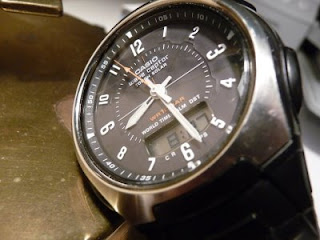 |
| Good watch. Works well, keeps the time. |
Men and watches. They love them. The question is why? For nearly five centuries men have worn them, beginning with primitive boxes worn around the neck which required winding twice a day and had just one hand guessing the time, yet watches are redundant now, with digital readouts on every computer screen and cell phone, inexpensive quarts wall clocks, digital television boxes, and news radio stations.
Yet the Complete and Total Loser has this in common with successful men: he wants a timepiece strapped to his skinny wrist during most of his waking hours.
This isn't a new desire. He's liked watches since boyhood. Then it was a diver's watch with a rotating bezel and a rubber strap. It was mechanical; this was some years before quartz watches became available to the public and several more years before they were affordable. Eleven years old, he loved the device, wearing it to bed. At night he would hear a faraway ticking sound that only years later he would deduce was the sound of the watch coming through the pillow.
By his senior year in high school light emitting diode watches became affordable. Ridiculous pieces, you had to push a button to see the dim glow of the numbers for a few seconds. Battery power was limited and woe to he who needed the time in bright sunlight. The Loser, however, spent most of his weekend hours in movie theaters, alone of course, watching at times several movies a week. If he liked them, he'd stay and view the same film three times in a sitting. The LED watch was a good friend, visible and clear in the dark.
He's had many watches through the years, each one either a perceived upgrade or, in the case of a no-frills Timex, a statement of a return to simplicity. He abandoned digital faces in the early 1980s, preferring the circular zen quality of analogue roundness.
In 1997 the Loser bought what he assumed would be his last watch: a Pulsar solar-powered model. Leave it in direct sunlight a few hours two or three times a year and it would keep time indefinitely. Years went by and he was happy with it but among failed jobs and career attempts he found he could get a watch with more bells and whistles. Sentimental about things, he had to make excuses to rid himself of the Pulsar. The metal band grabbed wrist hairs. The inside of the crystal fogged on cold days. The calendar wasn't perpetual and required adjustment on some months.
Next, a Casio, again solar powered. This one had an alarm and other features in a tiny liquid crystal diode screen at the bottom of the face. The problem with this watch, which cost just $35, was that it would sometimes go on strike for no discernible reason. The hands would freeze. There was no crown—buttons on the side were pushed to set the time, but pushing them in any combination failed to return the hands to life. After two hours or so, or less, the watch would wake itself, the hands would race forward and all would be well for weeks or longer. Or did it do this at night while the Loser snored on his twin mattress? He'll never know.
It and the Pulsar, both still working, sit on a shelf in a sunny part of his cluttered apartment.
His latest watch which he, ever the optimist, again thinks will be his last, is another Casio, also solar powered. This watch receives a radio signal late at night from an atomic clock in Colorado and is supposedly as accurate as a watch can be. The watch came with instructions printed with a micrometer-high font size and a steep learning curve. It seemed to think it was in Japan, telling the Loser the days of the week in kanji and was on Tokyo time. Its accuracy, though good, is not supreme. Although he's seen the little icon of a satellite dish receiving radio waves on the LCD part of the face—a modern, miniature version of the old RKO Pictures logo—it is often as much as ten seconds off the time on other devices.
The Loser likes this watch nonetheless. But he likes all watches. The way they make him feel independent, able to know a thing with some certainty with only a small piece of metal and plastic strapped to his wrist. How they tell him where he is in his day, a reminder of how long he has to complete an act, even rousing him from sleep. He hopes to have a working solar-powered watch on his wrist when he dies in an uncharted desert, the watch exposed to sunlight keeping time for only itself until the Sun dims, darkens, then vanishes into blackness.
No comments:
Post a Comment